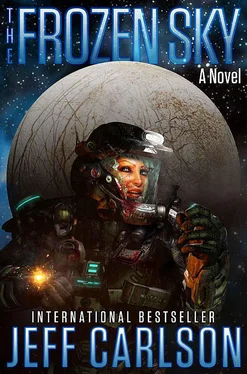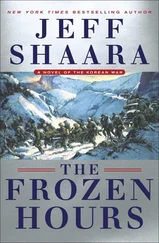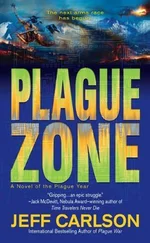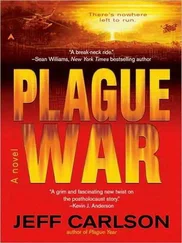For several days, the biologists were given the lion’s share of lab time and computing power. It was critical to know if Europan microorganisms were harmful to human beings.
Mecha had removed Vonnie’s armor in a clean lab after injecting her suit with plastic, encasing her in a protective film. Then they’d transferred her half-conscious body to another isolation chamber where they’d inundated her with UV, nanotech, antibiotics, antivirals, and gene sweeps. It might have made sense to quarantine her from everyone else, but she hadn’t been exposed outside her suit. Nor could they allocate an entire hab module to one person for weeks or months or however long it took Earth to decide she wasn’t infectious.
Coming to Europa was a prison sentence with additional sacrifices. All of them were given the same regimen of meds. The gene sweeps made Pärnits sick, yet he used his chills and nausea to joke with Vonnie instead of blaming her. “I need the meds anyway if I don’t want to glow,” he said, because Jupiter bathed its moons with radiation.
If a person could stand on Europa’s surface unprotected, she would absorb 500 rems every twenty-four hours. One day would make her ill. Two days would be a lethal dose.
Their electromagnetic shields, suits, and hab modules could minimize their exposure but not totally deflect the most lethal hazards such as gamma rays. Each crew member had an Earth-monitored AI calculating his or her individual risk. Merely driving across camp reduced their life expectancies. They would pay for their time here with pills and nanotech in addition to likely surgeries for bone cancer and melanomas — and they were ecstatic.
Everything they did felt significant. Even dinner was cause for celebration. Despite objections, Koebsch required everyone to gather for one meal each day. Otherwise they tended to divide into small groups, communicating across the camp by showphone or by radio if at all.
Dinner was a chance to brag and shout, posing questions, discussing theories, and flirting with other healthy geniuses caught up in the same jubilation.
They teased her about being a media star, although Vonnie sensed that two or three people were truly jealous.
The worst case of envy belonged to William Dawson, a gene smith, an Englishman in his seventies who was the oldest member of their crew. “Do try to leave us some of the limelight,” he said, pretending a smile that didn’t touch the papery wrinkles around his eyes.
Like Ash, Dawson was sensitive about his name. He permitted a certain level of informality. “Among colleagues, it’s not necessary to address me as ’Dr. Dawson,’” he said magnanimously, but he expected to be greeted as William , not Bill or Will .
Privately, Vonnie decided he was a stuffy old royal prick, which was fitting, since he’d mentioned in his official crew bio that he’d been christened after the English kings.
Dawson’s conceit wasn’t unusual. In the mid twenty-first century, many parents had turned to the past. Most people never left Earth, but humankind had begun to ascend into space in real numbers for the first time. They forgot their religions and their holidays, which hastened the decline of same beliefs back home. Babies were born in orbit and on the moon.
Children were given names to remember a heritage they’d never experience. The Americans called their kids silly, showy things like Christmas , Pacific , Birch , or Spring . In Europe, the trend was more elegant. Both cultures honored their ships and stations by celebrating famous historical figures like Washington or Robespierre , but the ESA org chart was littered with traditional names like Dublin O’Neal and Henri Frerotte. There was also an engineer they called Triple O because his full legal name eased off the tongue like Italian music — Antonio Leonardo Gravino.
Vonnie worked with Ash, Metzler, O’Neal, and Frerotte to forge their new sunfish-shaped probes. She joined their team immediately, although Koebsch predicted the job would unsettle her. He was correct that whenever Vonnie entered the machine shop, she cringed.
The eight-armed framework on their work bench looked like it had crawled out of her mind. Every night, despite the drugs, she dreamed of screeching monsters.
Their prototype was a muscular alumalloy sunfish 1.2 meters wide, identical to the smaller breed except for its guts and its missing skin. In real sunfish, the brain massed almost as much as it did in human beings. That was a lot of room to jam with processors and mem cards. Vonnie estimated they could give each probe a Level IV intelligence, but they wanted better. They wanted to surpass the threshold required in quantum computing to create Level III or II intelligences.
They needed more room. Their probes wouldn’t breathe or eat, so they gained space where a sunfish had its gills, lungs, hearts, and digestive and reproductive systems. Unfortunately, their probes required power plants, data/comm, and sonar. Radar and X-ray would also be ideal. Their design was overtaxed, but mounting external components on the probe would defeat its purpose of appearing like a sunfish.
One night over coffee, Ash took Vonnie aside. “Tell me about your AI,” Ash said.
“What do you mean? You deleted him.”
“Me and Koebsch. Yeah, I… What I mean is you did a great job doubling him up with your suit’s systems.”
“That was all I had.”
“I know. He was erratic, but integrating him with basic functions was a nice trick. Maybe we should try the same thing if we can overcome the instability.”
As an apology, it was lacking. Like many people who were too smart for their own good, Ash could be blunt, even graceless, and yet Vonnie appreciated the young woman’s attempt to show curiosity and respect.
“We can look into it,” Vonnie said. “First let’s see how much capacity Pärnits wants.”
Rauno Pärnits, the linguist, also served as an engineering assistant. He consulted with them in developing the prototype’s ability to wriggle and bend, running cables, servos, and flexors throughout its body and arms.
Generating movements like the sunfish would demand a huge amount of memory and computing power — maybe too much. Pärnits wanted to store most of his programs externally. Linking their probes remotely to an AI was the easy answer. They could use relays to maintain their signals, but Vonnie didn’t like it. What if the probes were cut off?
Pärnits was thirty-one, almost Vonnie’s age, lean and hawk-faced. He let her know his bed was open to her. So did Metzler and Frerotte. Vonnie might have paired with one of them if she wasn’t so confused emotionally. It was too soon. Physical comfort would be sweet, but she mourned for Lam even if the two of them hadn’t been lovers.
The compulsive behavior she’d experienced after being rescued had faded. Too much of her fixation had been a defense mechanism, blinding herself to her pain.
She didn’t trust herself anymore. Maybe she hadn’t been broken, but she’d come close. Now she wasn’t sure if the pieces still fit. Her superiors on Earth had told her to attend regular therapy sessions with an AI, which was humbling. She occupied herself with work and cooking and music. In fact, most days she was able to combine her two hobbies, listening to Beethoven while organizing hors d’oeuvres and soup for everybody in Module 02, which was dedicated to living space, exercise machines, and their tiny kitchen. She was a topsider again, which was probably where she was meant to be.
It was Day 16 when Koebsch sounded a Class 2 alert, overriding every data/comm line in camp.
“The Brazilians are going into the ice,” he said.
Читать дальше












